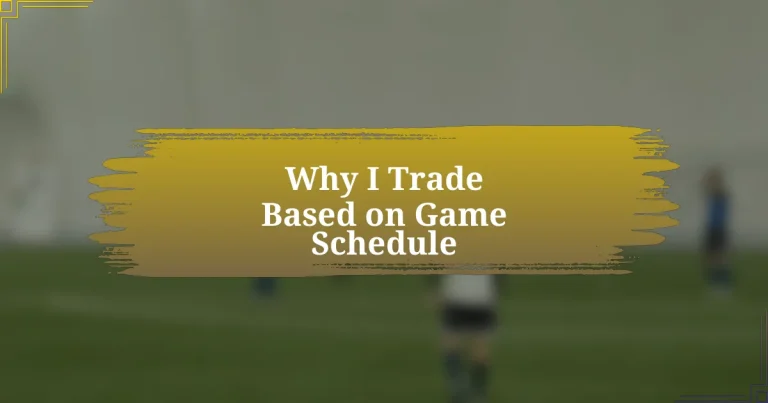Key takeaways:
- Understanding game schedules and matchups is crucial for fantasy football success; they influence player performance and lineup decisions.
- Analyzing opponent strengths, weaknesses, and player history against specific teams can lead to better strategic decisions.
- Emotional factors and team dynamics on game days, alongside statistical analysis, enhance decision-making in fantasy football.
- Effective schedule trading involves monitoring opponent strengths, player injuries, and considering long-term schedules for optimal point potential.
Author: Emma Hartley
Bio: Emma Hartley is an accomplished author known for her compelling narratives that explore the complexities of human relationships and societal themes. With a background in psychology and literature, her work often fuses emotional depth with sharp wit, captivating readers around the world. Emma’s novels have earned critical acclaim and numerous awards, solidifying her place in contemporary fiction. When she’s not writing, she enjoys hiking and volunteering with local literacy programs. Emma resides in Seattle with her two rescue dogs, and she is currently working on her next novel.
Understanding Fantasy Football Basics
Fantasy football is more than just a game; it’s a strategic blend of sports knowledge and psychological insight. I remember my first season, feeling overwhelmed by the sheer number of players and statistics available. It’s like being a coach without the whistle—how do you choose the right lineup?
Each week, the game schedule directly influences how players perform, and understanding their matchups can be crucial for success. I often find myself looking at players not just based on their past performances but also on who they are up against. For instance, I’ve seen a backup running back thrive against a weak defense, while a star player falters against a tough opponent. This inconsistency has taught me the importance of adaptability in my lineup decisions.
In this game, emotions run high on game day as every point counts. Can you feel that rush when a sleeper pick scores unexpectedly? It’s a thrill that keeps you engaged and reminds you that fantasy football is not just a hobby; it’s a dynamic experience where intuition and strategy collide.
The Importance of Game Schedules
Game schedules serve as the backbone of fantasy football strategy. I remember one particular season when I skipped on a highly-rated receiver simply because he was up against a top-tier defense. That decision was pivotal; timing can make or break your week. It’s critical to analyze when and where your players are competing.
The rhythm of the schedule influences player availability, too. A few years back, I had my eyes set on a running back who had a favorable stretch of games lined up. It felt game-changing when I realized I could snag him just before a series of matchups against weaker defenses. Those matchups are often the key to securing valuable points.
Furthermore, game schedules also impact players’ morale and momentum. A team on a winning streak tends to unleash their best performances, and I’ve seen how riding the wave of a successful team can elevate my fantasy roster. When I notice a team suddenly hospitalized with injuries or facing a series of tough defenses, I’m quick to reassess my lineup. How often have you missed out on taking advantage of a favorable matchup? Trust me; those are the moments that define a successful fantasy season.
How Schedules Affect Player Performance
It’s fascinating how opponents can drastically alter a player’s performance. There was a season where I loaded my roster with a quarterback who seemed unstoppable—until he faced a defensive unit that was notorious for shutting down passers. Watching him struggle felt like a punch to the gut, and it reminded me just how much I needed to consider the matchups in addition to the player’s talent.
Matchup timing can also expose players to higher risk. I recall picking a promising rookie wide receiver who had a tough stretch of games right out of the gate. Despite his potential, the cumulative pressure seemed to overwhelm him, leading to inconsistent performances that left me wondering if I should have waited. This experience taught me that a tough schedule can not only limit a player’s scoring opportunities but also impact their confidence.
On the flip side, some players thrive under pressure. I picked up a running back who, against all odds, managed to shine even when facing formidable defenses. It was exhilarating to see him rise to the challenge, proving that sometimes, the schedule can reveal hidden gems. Have you considered how a player’s demeanor changes in high-stakes matchups? It’s moments like these that can truly change the course of your fantasy season—and highlight the significance of understanding game schedules.
Analyzing Opponent Matchups
When I dive into analyzing opponent matchups, I often think about the impact of defensive schemes on a player’s performance. I remember a time when I didn’t take a particular secondary into account while drafting my team. That week, my star receiver faced a defense renowned for its lockdown cornerbacks, and it became painfully clear that I had missed an opportunity to switch strategies. What if I had prioritized matchups more carefully? It could have saved my season.
It’s also essential to consider player history against specific teams. For instance, I once held onto a tight end who consistently struggled against a specific opponent. Each game, it felt like watching a train wreck in slow motion, where I could sense his discomfort and inability to get open. These repeated matchups created a pattern I should have noticed earlier, yet it took me a few painful losses to realize how much matchups could dictate success.
In addition to current statistics, I look at factors like injuries and player rotations. Last season, I shifted my lineup when I found out that a top linebacker was missing from the opposing team. Suddenly, my running back had a much clearer path, and he exploded for 150 yards and two touchdowns. This thrill of recognizing an advantageous situation is why I emphasize the need to scrutinize matchups thoroughly; it can turn a mediocre week into a fantastical surprise. How often do you find yourself hunting for those matchup advantages? The right insights can make all the difference.
My Personal Game Schedule Strategy
When it comes to my game schedule strategy, I focus heavily on optimizing my lineup based on weekly matchups. A couple of years ago, I had a moment that drastically changed how I approached this. I hesitated to drop a struggling quarterback because of his name recognition, thinking he could bounce back. In hindsight, I should have analyzed the team’s schedule instead; with three top defenses ahead, I realized I was clinging to hope rather than strategy.
I also turn to bye weeks as strategic moments. I vividly remember a season when I planned ahead, grabbing a solid backup quarterback before his starter faced a team with a weak pass defense. That foresight resulted in a significant points increase for my team, proving to me that anticipating these scheduling quirks can yield big rewards. Have you ever thought about how much your schedule planning could shift your weekly outcomes? It’s those calculated risks that can turn a well-played season into a winning one.
Moreover, I consider the emotional aspect of game days. Sometimes, I look at the game schedule not just through a statistical lens but by weighing player morale and recent team dynamics. Like that time a franchise star returned from injury and ignited the whole squad’s spirit; it was clear he would dominate despite the tough matchup. Understanding these undercurrents adds richness to my strategy, allowing me to make decisions that feel right on an intuition level, not just based on numbers. How do you factor those emotional components into your fantasy football planning? I found that tapping into that instinct often leads to inspiring outcomes.
Tips for Effective Schedule Trading
When considering schedule trading, one crucial tip is to always pay attention to the strength of upcoming opponents. For instance, last season, I noticed my star running back had a string of games against defenses that struggled to contain the run. By making a strategic trade, I not only capitalized on his potential points but also positioned myself better for the playoffs. Have you ever analyzed those matchups before making a move? It transformed my decision-making process.
Another essential aspect is to keep an eye on player injuries and their impact on the team’s dynamics. There was a week when I traded for a wide receiver whose team recently lost a key player to injury, leading to a surge in his targets. That smart timing paid off, and I scored big. I can’t stress enough how important it is to stay tuned to injury reports and team news; it can make all the difference in your trading game.
Lastly, I always look at the long-term schedule when making trades. I might recall a time when I passed on a short-term gain for a player with an incredibly favorable slate in the following weeks. It felt risky at the moment, but that trade allowed me to ride the momentum through the playoffs when it mattered most. Are you thinking about the bigger picture in your trades? Doing that has been a game-changer for my strategy.















